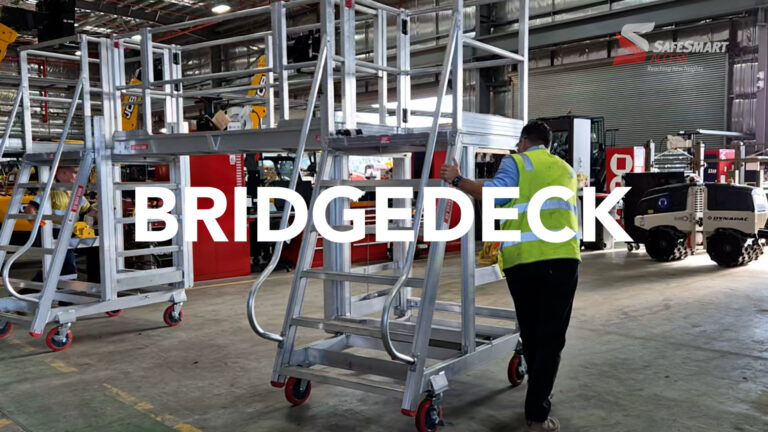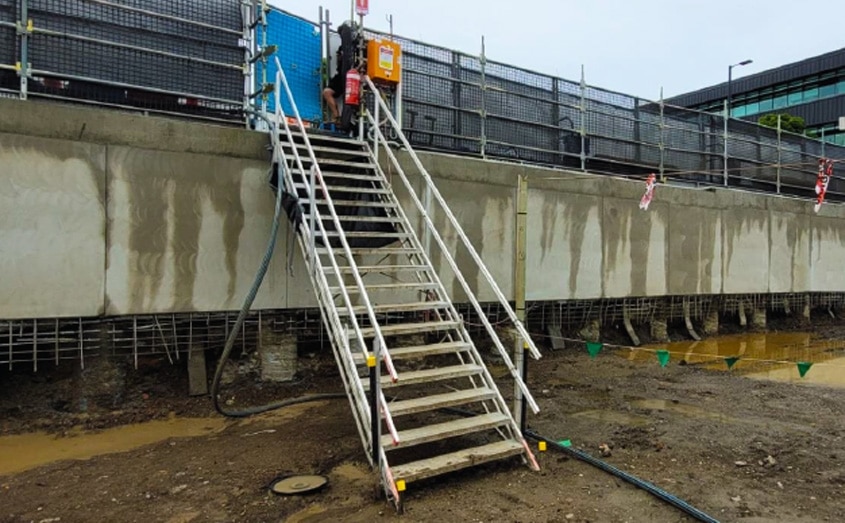
On larger construction projects, scaffolding and scaffold stretcher stair towers are the typical go-to when ingress & egress is required to and from the basement excavation.
It’s well known that scaffolding is very time-consuming to set up from a logistical and labour standpoint. Erection and dismantling can be messy & dangerous, and non-compliance or incorrect implementation puts crews at risk of injury. It can further hold up progress and create unnecessary risk when fast installations are a must.
Even once the scaffold is compliant and approved, work may only be undertaken for a few days until it’s needed to be adjusted or altered to suit project progression.
Scaffold stairs can be very costly, and the time it takes to set up and take down can be a real headache for project managers and engineers. But there is a better alternative to stretcher stairs – AdjustaStairs!
AdjustaStairs: Scaffold-Free Ingress & Egress Solution
Compliant, safe, simple, fast, and efficient – Formwork Stairs is the smart solution for stretcher stair access whenever you need to get into and out of your basement. And it has a range of features perfect for construction environments:
- Rated to 2.5kpa and fully adjustable, these stairs provide a straight-line access stairway, allowing workers can carry tools & equipment with ease.
- Safer than a ladder – allow multiple users to carry tools and equipment between levels at once.
- Simple to set up, taking significantly less time than scaffold!
- Instant adjustment – simply place the stairs at the level you require, and the treads will self-level to suit the height.
- Once the handrails are raised, and the stairs fixed top and bottom, they’re ready to use – no additional sign-off or certification is required.
If you need to get in and out of your basement excavation quickly, easily, and safely – look no further than AdjustaStairs for stair access! Plus, the cost savings can be significant.
Cost Comparison: AdjustaStairs vs Scaffold Tower
Australia’s most common basement size is generally at a depth of 8 metres. To access this depth from the ground level, a scaffold tower measuring at least 10 metres in height would be needed – with all the associated costs.
Setting up a scaffold tower includes the costs & downtime of labour, hire period, transportation, and set up/pack down time – as well as the costs of certifying the scaffold. This means extra personnel on site, as well as additional time and resources to get the job done. And does not include variation or modification costs due to stretcher stair requirements, restricted design or unforeseen modifications.
In comparison, a pair of AdjustaStairs with a landing would provide an ingress & egress solution that would take less labour, with no ongoing costs or ongoing modifications required. On average, this can be a saving of $5,000 to $10,000 to install the system, and as the stairs are purchased, they can be reused on the next project or basement.
Not only is AdjustaStairs a more cost-effective solution, but it’s also much safer and simpler to use. With no loose parts, there is no risk of trip hazards or missing components – meaning that workers can focus on the task at hand rather than worrying about safety concerns.
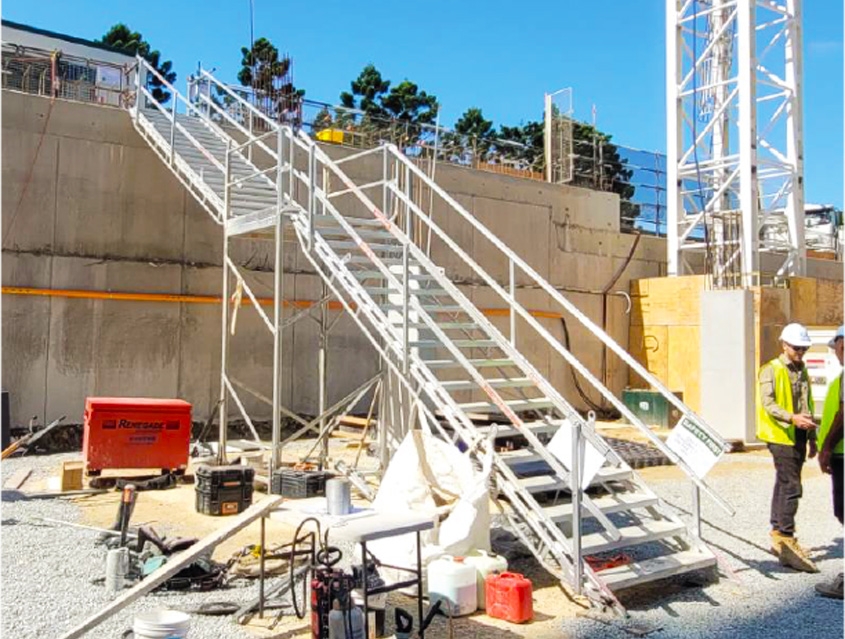
Comfortable Install & Basement Staircase Access
Another great aspect of AdjustaStairs is the installation process. First, the stairs are secured from the top wall cap and lowered with a craned into place. The stairs automatically level as the bottom step is lowered to the mid or hanging landing. Once in position, the next set of AdjustaStairs are secured to the mid-landing, then onto the basement floor.
Because of their modular design, AdjustaStairs can be easily reconfigured to suit any changes in the layout of your basement excavation with various landings.
Adjustastairs & Hanging Landings
Hanging landings are simply fixed to the side wall of the basement and create a long stair system. It takes up a much smaller footprint than a scaffold tower, allowing the use of the rest of the space underneath.
The modular design of AdjustaStairs and landings means that they can be easily reconfigured to suit any changes in any basement excavation.
Adjustastairs & Mid Landings
The Mid landings suit landing heights of up to 4m and allows the stairs to be configured in either straight line access or off 90 degrees. By using two landings, you can also create a returning stair in a Z-pattern. This is perfect for limited space or you need to access different levels within the same stair system.
But are there risks? Let’s go over the scaffolding risks first.
Basements & Scaffolding Hazards
While scaffolding has been the traditional way to provide egress and access to a basement, it is crucial to ensure that the scaffold is appropriately installed and maintained throughout use. And there are many facets to scaffolding design and installation that must be considered to create a safe working environment. Some of the risks needing to be eliminated can include:
- Inadequate foundations can be a significant issue when erecting scaffold, as it can cause the structure to wobble or even collapse.
- Poor tying or bracing can result in scaffold collapse.
- Overloading. Scaffold towers can be easily overloaded through workers or tools over time.
- Guardrails must be in place when working at height, as they provide a physical barrier between workers and potential falls.
- Old or rusty equipment can be a major hazard.
- Degrading connection strength over time.
And those are just some of the issues that project engineers are all too familiar with.
Most scaffold work is subcontracted due to ticketing and cost-effectiveness for the project, so it can be challenging to assess the quality of the work, compliance of components, and safety of the structure by project personnel. And you must have it inspected regularly to ensure it is safe for crews on-site.
To mitigate these risks, risk assessments take place. However, there is always the potential for human error, and accidents can still occur. With more personnel required to install scaffold towers, there is an increased risk of injury during installation and dismantling. Then there is the assessment of the severity of potential injuries at height while crews are working on the structure.
Overall, it can be a complex and costly process to get scaffold erected, with varying degrees of compliance. In contrast to scaffolding, AdjustaStairs eliminates and solves many safety issues regarding basement access.
The system requires fewer personnel to install, has no ongoing certification, is secured to the concrete structure throughout, has no loose parts and is much faster to erect and dismantle.
The stair system complies with AS/NZS 1576:2019.1, which provides guidance for the design and construction of scaffolding structures. And is manufactured with high-tensile aluminium providing superior strength and durability, meaning it will withstand torquing or wobbling that may be encountered with a traditional scaffold.
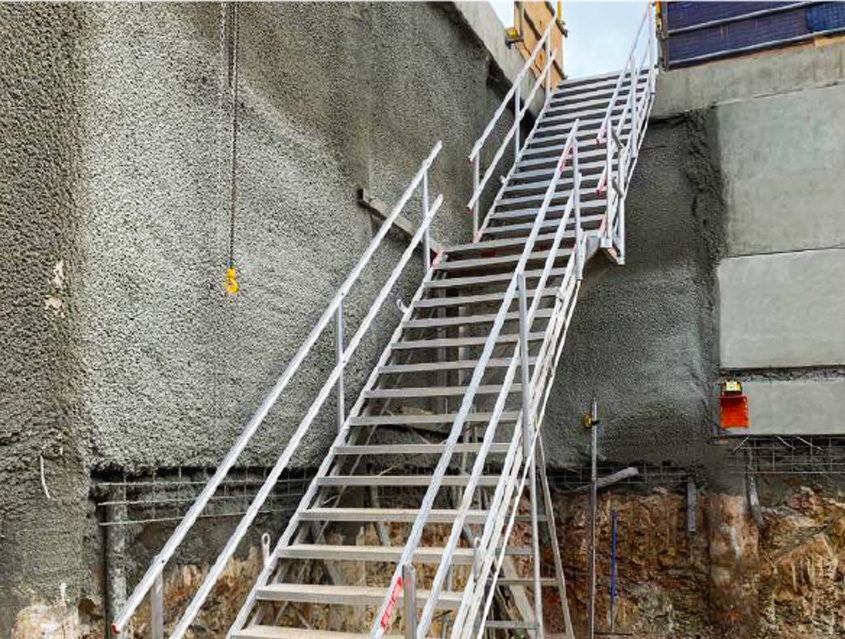
The Basement Access Bottom Line
Basement scaffolding has been the traditional way to provide egress and access to a basement, but it can be difficult to install and maintain and is often subcontracted where non-compliance might occur.
The cost savings of using AdjustaStairs over scaffold is significant. Not only is scaffold more expensive to install, it also requires more personnel and needs to be inspected regularly for safety. As opposed to AdjustaStairs that can have a saving of between $5k to 10k, plus you keep the equipment for the next job.
A scaffold can be dangerous to install and use, as it can easily overload and collapse if not properly installed. In addition, there needs to be ongoing inspections with a significantly increased risk of accidents occurring over time due to wear or loosening components. In contrast, a smaller team can install AdjustaStairs quickly and efficiently, reducing fall risks, with no ongoing inspections necessary.
Overall, it’s clear that AdjustaStairs is a much better alternative to stretcher stairs & scaffolding for accessing a basement. Not only is it easier to install and take up less space, but it is also much more secure. So choose the much safer, efficient, and cost-effective way to access a basement for your next project – AdjustaStairs.



